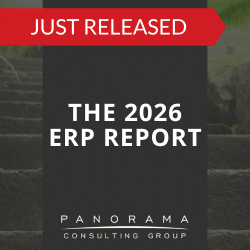Most organizations have large volumes of data that they collect and store. Companies must decide whether to secure this data on-site or host it in the cloud. Where you store your data is an important decision to make, especially as your business grows.
If you’re evaluating enterprise software and exploring deployment and hosting options, it’s important to understand the differences between on-premise vs cloud security. Today, we’re outlining the pros and cons of each so you can make the best choice for your organization.
On-Premise vs Cloud Security
Pros of On-Premise Security
With an on-premise system, you have a physical perimeter around your data. In addition, you have full control of your servers and can customize them as you wish.
For example, you can decide when it’s time to delete data, and you can ensure a thorough scrub of all hard drives before disposal.
Another benefit of on-premise enterprise software is that you can easily control data access, as there is only a single point of access for each user. While it’s true that remote employees can use a VPN to log in from almost anywhere, VPNs use identity management as a means of security.
Cons of On-Premise Security
One of the biggest cons of on-premise security is that you need a large enough space to house your servers. You will also need skilled security professionals.
If you want to scale, you’ll need to acquire even more space and hire even more security personnel.
Handling your own data storage, maintenance, and security ultimately creates a cost issue. There are many upfront costs, and this is a barrier to entry for many organizations.
Another issue is staying up to date. Without automatic updates, the security tools in an on-premise environment can quickly become outdated, unable to keep up with new threats.
2026 Clash of the Titans
SAP, Oracle, Microsoft, and Infor each have a variety of systems that can support data-driven decision-making. We surveyed customers of these four vendors to find out what their selection and implementation process was like.
Pros of Cloud Security
When you store and protect your data using cloud technology, security responsibilities are shared between the organization and the cloud service provider (CSP). Depending on what type of service you choose, your responsibilities might differ:
- Infrastructure as a Service (IaaS) – You’re not responsible for physical elements, such as data centers or the hardware that applications are hosted on. However, you do need to manage the provisioning of virtual machines, secure the virtual network, and monitor all applications and interfaces within the network.
- Platform as a Service (PaaS) – The cloud service provider assumes additional security responsibilities. Since you’re paying for an entire platform, as opposed to only the cloud infrastructure, the CSP manages the same duties it does for IaaS but also provisions the virtual machines and secures the virtual network. Meanwhile, you’re responsible for managing your data, monitoring your interfaces, and securing your applications.
- Software as a Service (SaaS) – The CSP is responsible for all the previously mentioned duties plus they’re responsible for the application itself. This makes sense as now you’re paying to use the CSP’s application hosted on their platform and infrastructure. In this case, you’re responsible for the security of your data and all interfaces.
In each of these scenarios, you only need to pay for the level of storage you currently need. Then, as you grow, you can easily scale because you aren’t increasing your storage capacity but rather contracting more storage from your vendor.
The ability to scale quickly is a key benefit for companies using cloud-based systems for storing data.
Another benefit is the access to security tools built by cloud service providers and vendors. For an additional fee, CSPs typically offer built-in security tools that help you identify and remediate network vulnerabilities. In fact, many CSPs have invested in machine learning to help identify weak spots in customers’ systems and notify them immediately in the event of an attack.
Cons of Cloud Security
The biggest drawback of using an online vendor is that their security options are usually one size fits all. This limits the amount of customization you can do.
Another concern is points of access. With cloud-based security, employees can access company applications on any device with internet access.
APIs can access your applications, as well. APIs.
Many cloud service (and software) providers pre-build APIs into their platforms. While this ease of interfacing has its benefits, it adds an additional layer of complexity when it comes to security.
Fortunately, not all permissions are typically needed by an API to perform its functions. However, even with limited permissions, you need to investigate the security of the system connected by the API.
Preparing for Software Selection
Deciding between on-premise vs cloud security is an essential component of software selection, whether you’re exploring ERP systems, SCM systems, or other types of enterprise software. The more you know about the benefits and drawbacks, the better prepared you’ll be to discuss your needs and priorities with vendors and service providers.
This blog has barely scratched the surface of all the factors you must consider when evaluating security options. To learn more, contact our ERP consultants below.













